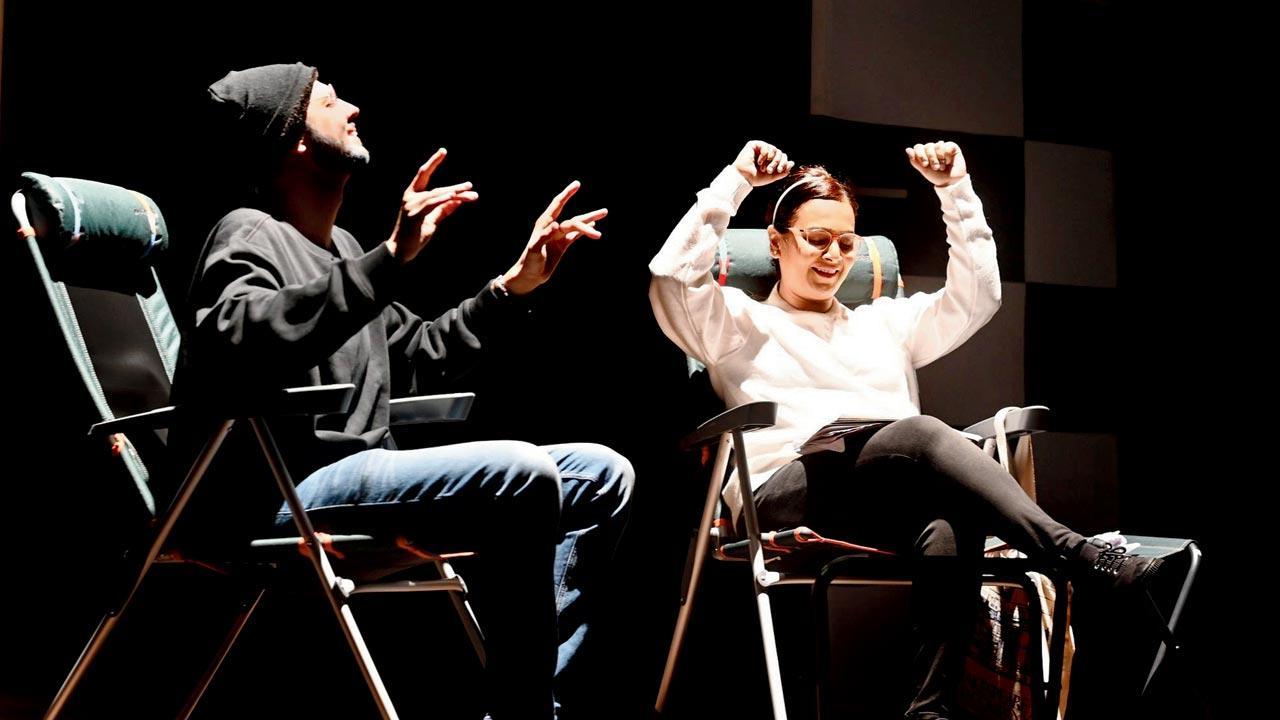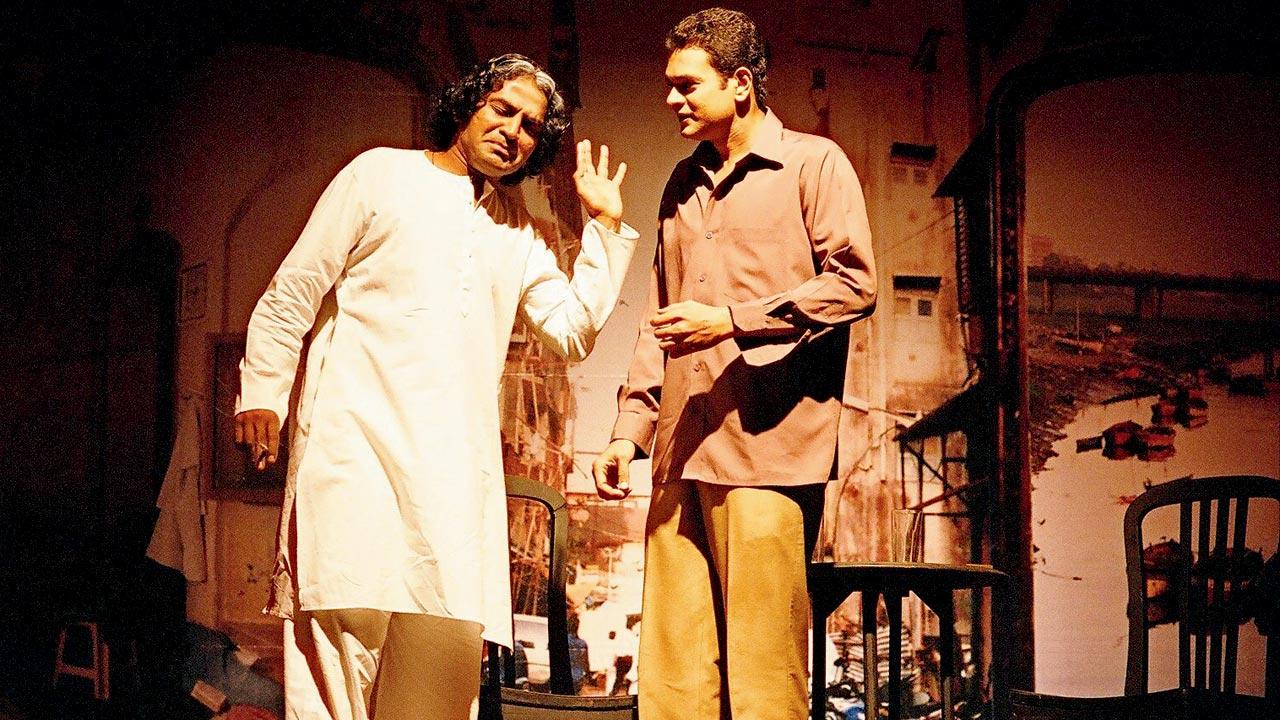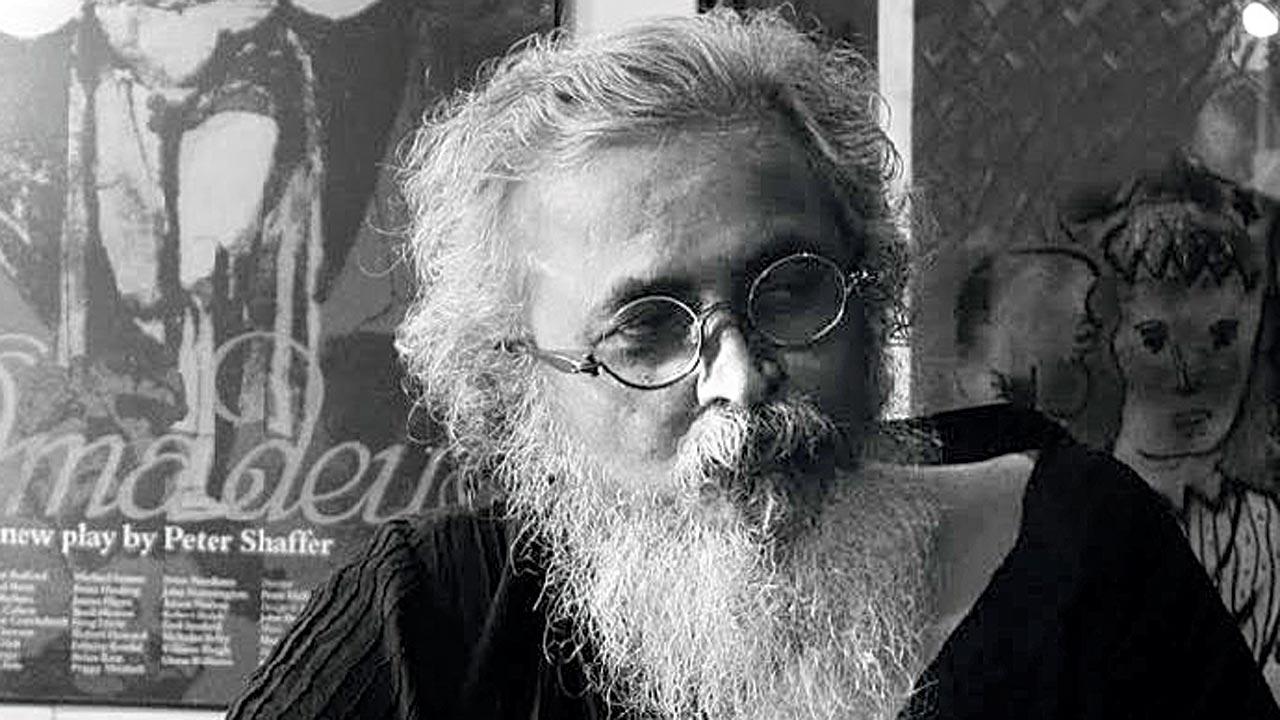A Gujarati play explores a relatively undiscussed personal side of late Apple founder Steve Jobs—his complex relationship with daughter Lisa

Rohan Trivedi as Steve Jobs, and Disha Savla Upadhyay, who plays daughter Lisa in Mr Apple. A Hinglish version of the play is currently in the works
![]() There were two risks of watching a Gujarati play with my 23-year-old son. First, he was more aware of the subject—Apple Inc. founder Steve Jobs—especially, the earlier depictions of the icon in feature and documentary films. Second, he was less accepting of the treatment and tenor of the two-act play Mr Apple, written by Shishir Ramavat and directed by Manoj Shah. The risks were worth taking because both of us valued the mid-afternoon aural treat of motivational granthik Gujarati. In fact, the play lends itself well to non-Gujaratis too, because of the ample use of English. A Hinglish version of the play is currently in the works.
There were two risks of watching a Gujarati play with my 23-year-old son. First, he was more aware of the subject—Apple Inc. founder Steve Jobs—especially, the earlier depictions of the icon in feature and documentary films. Second, he was less accepting of the treatment and tenor of the two-act play Mr Apple, written by Shishir Ramavat and directed by Manoj Shah. The risks were worth taking because both of us valued the mid-afternoon aural treat of motivational granthik Gujarati. In fact, the play lends itself well to non-Gujaratis too, because of the ample use of English. A Hinglish version of the play is currently in the works.
ADVERTISEMENT
Mr Apple, which premiered at the Prithvi Festival, starts on a high-pitched—rather screeching—note and stays that way during its two-hour run. Those who can deal with this premise, can enjoy the moot point conveyed by the two lead actors, Rohan Trivedi (Steve Jobs) and Disha Savla Upadhyay (daughter Lisa Jobs). It’s essentially a string of monologues of two wronged-abandoned individuals who grudge their fate. Jobs, the charismatic and successful pioneer of personal computers, resents the dual rejection by biological and adoptive parents. He was raised by a lower-middle class couple, unlettered but loving, who offered him a garage space for exploration and tinkering. While Jobs did make it big in computer technology, he suffered an immense sense of loss and deprivation, which also reflected in his flawed relationships, especially with his daughter Lisa. Hers is a rant against an eccentric self-seeking father, who made big money for himself, but parted with a paltry maintenance ($385) sum for his daughter.

Lisa and Steve Jobs come face to face. They present their explanations and their raw human impulses. They quarrel over an irreconcilable past. Towards the end of the second act, when Jobs is nearing his life’s end due to pancreatic cancer, the father-daughter come closer and realise their bond. Even as Jobs exits the stage, he reminds his daughter that his enduring curious spirit will be ever-alive in the personal phones ringing around her.
Shishir Ramavat’s script is more well-meaning than good. As director Shah told this columnist, he and Ramavat were in constant dialogue, which showed in the several transitions in the script. The duo did not want to create an info-pack on Jobs’ career trajectory. Enough is archived on the Internet, and in films, which delineate the college dropout genius who rose as the CEO of Apple; the chairman of Pixar, the founder-CEO of NeXT, among others. The play is not a reiteration of the series of breakthroughs he made. It is meant to be an enquiry into Jobs’ greatness and the definition of greatness. It also addresses the larger question: Can true greatness be devoid of basic human obligations? Can a high-achiever truly be great if he is unable to connect with his kin on a human level? Or that doesn’t eclipse his or her worth!

Shah feels Mr Apple deserves a higher pitch of delivery because it presents a high-power intense drama. “It resonates like a Greek tragedy which operates in a charged livewire space, not in the everyday realistic realm,” he justifies. He doesn’t see the rationale in toning down the two characters who post-mortem each other’s lives and choices.
In the past, Shah has been a champion of low-on-props minimalist theatre, devoid of loud commercial razzmatazz and laugh riots. His choices have been rather niche. He has mounted many offbeat solo-actor biographical plays. He weaves multiple literary influences, which enrich the Gujarati theatregoer and the uninitiated too. For instance, his homage to 17th century poet Akho or his resuscitation of poet-gazalkar Mareez (Ghalib of Gujarat) added a new dimension to Gujarati theatre. So did Apurva Avsar (2007) that depicted Jain philosopher-mystic Shrimad Rajchandra. His Master Phoolmani—a Gujarati rendition of Marathi playwright Satish Alekar’s Begum Barve—was a breath of fresh air. It was a marriage of two regional traditions—borrowing from the lives of Gujarati actor-singer Jayashankar Sundari and Maharashtra’s musical icon Bal Gandharva. Playwright Chandrakant Shah and director Manoj Shah beautifully adapted the seedy and thought-provoking world of a yesteryear backstage artiste, who only has his fantasies to fall back on. Shah’s use of the Bhangwadi style theatre matched with Begum Barve’s vibe. I have a vivid recollection of Master Phoolmani’s animated musical sequences (Lailo lailo lailo sungandh thi bharpur agarbati lailo sahebo...), although I watched the Horniman Circle garden show way back in 1999 during the pre-Google era. Phoolmani has been part of my theatre consciousness, and so is Akho.
However, Mr Apple did not touch me in any special way. At one point, I literally worried about the vocal chords of the key actors, because they have a long run ahead. Going by the response of the initial plays, Shah has planned an itinerary up to March 2023, which includes performances in Ahmedabad, Rajkot, Kolkata and Mumbai.
Mr Apple’s sets are conceptualised by artist Atul Dodiya. The lead pair on stage are backdropped against a range of black-and-white doors, which do not have windows. The doors are indicative of large vistas of knowledge opened by Steve Jobs. The doors are also to be perceived in the context of the MS Windows operating systems, invented by software entrepreneur Bill Gates. If this contrast is lost on the audience, the lead actor (playing Jobs) repeatedly refers to the Jobs Versus Gates rivalry. When Microsoft released Windows in 1985, Jobs accused Gates of ripping off Apple’s user interface. The play, Mr Apple, harps on it rather indulgently, which at one point generates a forced sense of humour.
While I have a problem with Mr Apple’s delivery mechanism, its twin messages are definitely commendable. First, in this digital era when our smartphones help us forge cross-continental connections, we should value and achieve true organic bonds, not just touch-and-go superficiality. Second, we should be able to objectively perceive our role models and idols. They are not above enquiry, irrespective of the wonder jobs they accomplish.
Sumedha Raikar-Mhatre is a culture columnist in search of the sub-text. You can reach her at sumedha.raikar@mid-day.com
 Subscribe today by clicking the link and stay updated with the latest news!" Click here!
Subscribe today by clicking the link and stay updated with the latest news!" Click here!







